
David Nesta "Ziggy" Marley is a Jamaican reggae musician. He is the son of reggae icon Bob Marley and Rita Marley. He led the family band Ziggy Marley and the Melody Makers until 2002, with whom he released eight studio albums. After the disbandment, Ziggy launched a successful solo career, releasing eight solo studio albums on his own label, Tuff Gong Worldwide. Ziggy continues his father's practice of recording and self-releasing all of his music. Marley is an eight-time Grammy Award winner and a Daytime Emmy Award recipient.
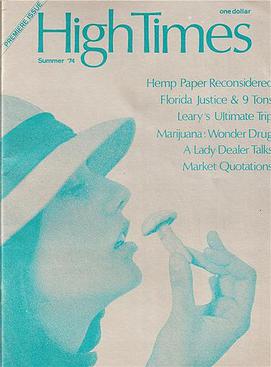
High Times is an American monthly magazine that advocates the legalization of cannabis as well as other counterculture ideas. The magazine was founded in 1974 by Tom Forcade. The magazine had its own book publishing division, High Times Books, and its own record label, High Times Records.

Julian Ricardo Marley is a British-Jamaican reggae musician, songwriter, producer and humanitarian. He is the son of reggae music icon Bob Marley, and Lucy Pounder. In 2024, he received a Grammy Award for Best Reggae Album for his collaboration album with Antaeus, Colors of Royal (2023).
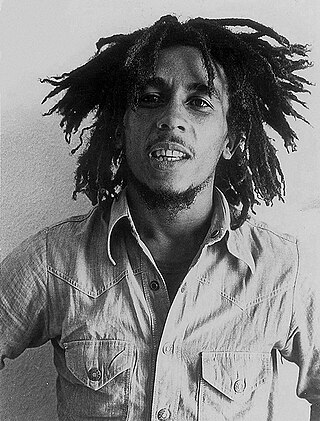
Robert Nesta Marley was a Jamaican singer, songwriter, and guitarist. Considered one of the pioneers of reggae, he fused elements of reggae, ska and rocksteady and was renowned for his distinctive vocal and songwriting style. Marley increased the visibility of Jamaican music worldwide and made him a global figure in popular culture. He became known as a Rastafarian icon, and he infused his music with a sense of spirituality. Marley is also considered a global symbol of Jamaican music and culture and identity and was controversial in his outspoken support for democratic social reforms. Marley also supported the legalisation of cannabis and advocated for Pan-Africanism.
Cedella Marley Minto is a Jamaican singer. She is the daughter of reggae singers Bob Marley and Rita Marley and the mother of Skip Marley. She was in the group Ziggy Marley and the Melody Makers along with her siblings. With the group, she has won three Grammy awards.

Cannabis culture describes a social atmosphere or series of associated social behaviors that depend heavily upon cannabis consumption, particularly as an entheogen, recreational drug and medicine.
The World Famous Cannabis Cafe is a former Cannabis dispensary open between 2009 and 2016 in Portland, Oregon.

Malawian cannabis, particularly the strain known as Malawi Gold, is internationally renowned as one of the finest sativa strains from Africa. According to a World Bank report it is among "the best and finest" marijuana strains in the world, generally regarded as one of the most potent psychoactive pure African sativas. The popularity of this variety has led to such a profound increase in marijuana tourism and economic profit in Malawi that Malawi Gold is listed as one of the three "Big C's" in Malawian exports: chambo, chombe (tea), and chamba (cannabis).

Privateer Holdings is an American private equity company that invests in the legal cannabis industry. It is headquartered in Seattle, Washington and employs more than 350 people in seven countries.
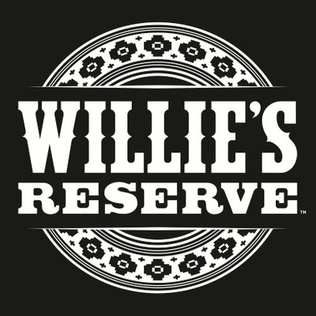
Willie's Reserve is a company started by singer-songwriter Willie Nelson in 2015. Nelson, a longtime supporter of marijuana legalization announced the launch of chain stores of the brand after marijuana was legalized in different states. The first stores were planned to be opened in the states where cannabis was legalized in 2016, with an expansion planned as other states follow.
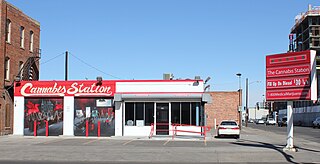
Cannabis dispensaries in the United States or marijuana dispensaries are a type of cannabis retail outlet, local government-regulated physical location, typically inside a retail storefront or office building, in which a person can purchase cannabis and cannabis-related items for medical or recreational use.

The Florida Medical Marijuana Legalization Initiative, also known as Amendment 2, was approved by voters in the Tuesday, November 8, 2016, general election in the State of Florida. The bill required a super-majority vote to pass, with at least 60% of voters voting for support of a state constitutional amendment. Florida already had a medical marijuana law in place, but only for those who are terminally ill and with less than a year left to live. The goal of Amendment 2 is to alleviate those suffering from these medical conditions: cancer, epilepsy, glaucoma, positive status for human immunodeficiency virus (HIV), acquired immune deficiency syndrome (AIDS), post-traumatic stress disorder (PTSD), amyotrophic lateral sclerosis (ALS), Crohn's disease, Parkinson's disease, multiple sclerosis, chronic nonmalignant pain caused by a qualifying medical condition or that originates from a qualified medical condition or other debilitating medical conditions comparable to those listed. Under Amendment 2, the medical marijuana will be given to the patient if the physician believes that the medical use of marijuana would likely outweigh the potential health risks for a patient. Smoking the medication was not allowed under a statute passed by the Florida State Legislature, however this ban was struck down by Leon County Circuit Court Judge Karen Gievers on May 25, 2018.
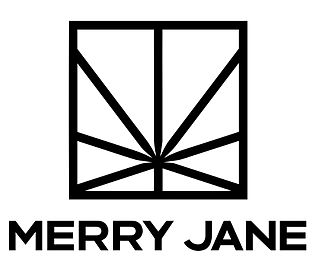
Merry Jane is a cannabis-focused digital media platform launched by rapper Snoop Dogg in 2015, with media entrepreneur Ted Chung. The site features editorial content on the business and politics of the cannabis industry, original video series as well as a database for identifying cannabis strains and dispensaries.

Acapulco Gold is a strain of Cannabis sativa that was popular during the 1960s counterculture movement for its potency, taste, and unique color. It is a landrace cannabis variety that is an 80% sativa and 20% indica hybrid reportedly produced by crossing a native Mexican strain with a Nepalese indica. It is reported to be difficult to cultivate indoors under lights and is better grown as an outdoor plant due to its large size. This cannabis strain flushes in gold and amber tones in the final stages of flowering, producing dense golden buds with a peppery and citrus odor and flavor, and averages 24% THC and 1% CBD. The terpene profile of Acapulco Gold is mostly caryophyllene, a spicy terpene also found in black pepper. Myrcene is also present and contributes to the earthy aroma of the strain, as well as Limonene which adds a lemon aroma/flavour.

The Cannabis Act (C-45) of June, 2018 paved the way for the legalization of cannabis in Canada on 17 October 2018. Police and prosecution services in all Canadian jurisdictions are currently capable of pursuing criminal charges for cannabis marketing without a licence issued by Health Canada. The Supreme Court of Canada has held that the federal Parliament has the power to criminalize the possession of cannabis and that doing so does not infringe upon the Canadian Charter of Rights and Freedoms. The Ontario Court of Appeal and the Superior Court of Ontario have, however, held that the absence of a statutory provision for medical marijuana is unconstitutional, and to that extent the federal law is of no force and/or effect if a prescription is obtained. The recreational use of cannabis has been legalized by the federal government, and took effect on 17 October 2018.

Terms related to cannabis include:
Leafs By Snoop is a cannabis brand owned and promoted by the rapper Snoop Dogg and produced by Canopy Growth Corporation.

Jane West is an American cannabis activist and CEO of the cannabis lifestyle brand Jane West. She is best known as the founder of cannabis networking organization Women Grow. In 2016, Inc. magazine named her “the most widely recognized female personality in cannabis,” and in 2019, InStyle magazine included her in its 2019 Badass 50 list highlighting women who are “changing the world.”














